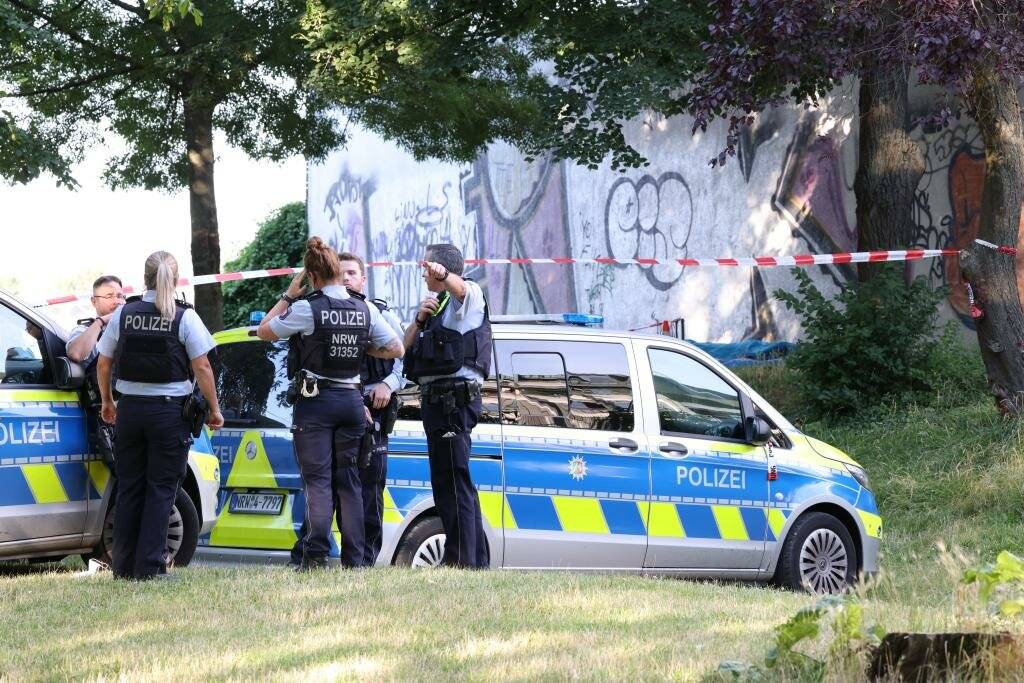Corpse found in Bonn Head was severed with sharp cutting instrument
Bonn · New details emerge from the forensic pathology report about the severed head that was found outside the Bonn District Court. The body of the 44-year-old homeless man remains in the coroner's office for now.
Police are still looking for witnesses in the case of the 38-year-old man who placed a human head outside the Bonn District Court on Tuesday evening. So far, authorities only know that passers-by saw the man depositing the head there. A homicide squad is investigating when and how the head was severed from the torso and who is responsible. The torso was found in a remote corner at the Alten Zoll (Old Customs). "We have received some tips from the public and are now following them up," says police spokesman Michael Beyer. There is also new information from the forensics report.
An examination in the forensic pathology department at the University of Bonn yielded important findings. The autopsy revealed that the 44-year-old homeless man had died due to a serious illness. An exact time of death could not be determined but was likely last Monday or Tuesday. The torso was lying under a tree, and it had been wrapped in a sleeping bag. Homeless people often spend the night at this location of the Alten Zoll, and it is also known as an area for drug consumption. Forensic pathologists determined that the head had been severed with a sharp cutting instrument but the exact instrument used to commit the crime is still not known. The 38-year-old has so far refused to testify and is in custody at a Cologne correctional facility. It is believed that he knew the victim, and that when he deposited the head (outside the District Court), he was under the influence of drugs.
Some details of the crime are not crucial for the prosecution, which accuses the 38-year-old homeless man of desecration of the dead, as prosecutor Sebastian Buß explains. "For this offense, it is not relevant when the 44-year-old died, but that he died." The 38-year-old is being charge with desecration of the dead - which can be established on the basis of the suspect picking up and moving the head of the deceased. This is punishable by a fine or imprisonment up to three years.
City pays for burial in certain cases
The body remains in the coroner's office for now. The 44-year-old had no permanent residence and is apparently not known among those in the “homeless scene”. By law, every citizen is entitled to a funeral. In principle, relatives are obliged to pay for it according to a line of succession. First it is spouses, then children, then parents, then siblings and finally other relatives who are responsible for the funeral. "This is verified by the administration, which also makes the arrangements. The relatives are contacted and cost reimbursements are claimed," explains Bonn's deputy city spokesman Marc Hoffmann.
If there are no relatives who can take care of the burial, then the city will do it. Unless there are known objections, cremation is chosen. "Burial will be in a maintenance-free grave in the North Cemetery. A dignified setting is created for the deceased, a funeral service is held and there is an urn floral arrangement," Hoffmann says. A memorial stone accompanies the urn, since acquaintances or distant relatives often ask about the gravesite at a later date.
But even if there are relatives and they can not afford the cost of a funeral, the public authorities intervene. An application can be made to the social welfare office to have the costs covered. The income and financial circumstances of the relatives are then examined. The city also steps in if the family relationship has broken down.
This procedure is also common in other municipalities. In Cologne, for example, the public order office searches for possible relatives, as deputy city spokeswoman Sabine Winkelhog explains. In the process, they also determine whether the deceased person has made funeral arrangements or whether there are indications of a will. A mortician takes care of the further formalities. "The deceased person is buried in the ground or cremated in accordance with denominational requirements or the person's own burial wishes.”
(Orig. text: Nicolas Ottersbach / Translation: Carol Kloeppel)




